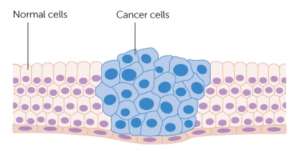
Breast cancer in men is a rare and understudied disease. Few prospective studies focusing on breast cancer in men have been conducted, and clinical trials of breast cancer treatments have routinely excluded men, Why; Most of the published data have been collected from small cohorts of patients treated at single institutions, and treatment recommendations have been extrapolated from the results of clinical trials that enrolled only women. Over the past decade, substantial efforts have been made to gain a better understanding of the biologic features, most effective treatments, and outcomes of breast cancer in men and to identify clinically relevant differences in the disease according to sex. Although breast cancer in men and in women is similar in some ways, breast cancer in men has distinct features. In this article, I review current data on the epidemiology of breast cancer in men, its pathological and clinical characteristics, and prognosis and treatment, with a focus on recent advances in our understanding of this disease thanks to innovation and technology.
Breast cancer in men accounts for approximately 1% of all breast cancers. In the United States in 2018, an estimated 2500 incident breast cancers will be diagnosed in men, and approximately 500 men are expected to die from this disease. 12 Data from the Surveillance, Epidemiology, and End Results (SEER) program indicate that the age-adjusted incidence rate has increased from 0.85 cases per 100,000 men in the general population in 1975 to a high of 1.43 cases per 100,000 in 2011.13 The lifetime risk of breast cancer for a man is approximately 1:1000, as compared with 1:8 for a woman.2 As is the case with many cancers, breast cancer in men is an age-related disease, with incidence rates rising steadily with age. The average age at diagnosis is approximately 5 years older for men than for women (67 years vs. 62 years).5 Black men appear to be at greater risk than non-Hispanic white men.13,14 The risk of breast cancer is doubled for men who have a first-degree relative with the disease.15 Risk factors for breast cancer in men are shown below
Demographic: Increasing Age, Black Race, Family history of breast cancer. Genetic: BRCA2, BRCA1, CHEK2, PALB2. Environmental: Radiation Exposure. Hormonal: Increased serum estradiol, Klinefelter’s syndrome, Gynecomastia, liver disease, Obesity, Testicular abnormalities. Mutations in BRCA are among the most clearly established risk factors for breast cancer in men. Several genes have also been identified that confer a moderate risk of breast cancer for men, as well as for women. Radiation exposure has been reported as a risk factor for breast cancer in men. Elevated levels of estrogen are thought to predispose men to breast cancer, the increased risk may be related to a high ratio of estrogen to androgen.
Several studies have evaluated outcomes in men with breast cancer. In general, men with breast cancer have lower unadjusted rates of overall survival than do women with breast cancer. However, much of this difference can be explained by a more advanced stage of disease and an older age at diagnosis, as well as a shorter life expectancy in general, for men than for women. Black men with breast cancer have worse outcomes than white men with breast cancer, although the differences are diminished after adjustment for insurance coverage and income level. Men who are older at diagnosis, have more advanced disease, and have triple-negative breast cancer have lower survival rates than younger men, those with less advanced disease, and those with a subtype other than triple-negative disease.64 Survival rates have improved over time for both men and women with breast cancer, but unfortunately, the improvement for men has lagged behind that for women. In a study of men with breast cancer in Europe and Asia, men had lower 5-year survival rates than women in the unadjusted analysis but had higher survival rates than women after adjustment for demographic characteristics, disease stage, and treatment. Hence Breast Cancer kill Men.




 Lay KPMG audit report on SML-GRA contract before Parliament – Isaac Adongo tells...
Lay KPMG audit report on SML-GRA contract before Parliament – Isaac Adongo tells...
 Supervisor remanded for stabbing businessman with broken bottle and screwdriver
Supervisor remanded for stabbing businessman with broken bottle and screwdriver
 NDC watching EC and NPP closely on Returning Officer recruitment — Omane Boamah
NDC watching EC and NPP closely on Returning Officer recruitment — Omane Boamah
 Your decision to contest for president again is pathetic – Annoh-Dompreh blasts ...
Your decision to contest for president again is pathetic – Annoh-Dompreh blasts ...
 Election 2024: Security agencies ready to keep peace and secure the country — IG...
Election 2024: Security agencies ready to keep peace and secure the country — IG...
 People no longer place value in public basic schools; new uniforms, painting wil...
People no longer place value in public basic schools; new uniforms, painting wil...
 'Comedian' Paul Adom Otchere needs help – Sulemana Braimah
'Comedian' Paul Adom Otchere needs help – Sulemana Braimah
 Ejisu by-election: Only 33% of voters can be swayed by inducement — Global InfoA...
Ejisu by-election: Only 33% of voters can be swayed by inducement — Global InfoA...
 Minority will expose the beneficial owners of SML, recover funds paid to company...
Minority will expose the beneficial owners of SML, recover funds paid to company...
 Prof. Opoku-Agyemang has ‘decapitated’ the NPP’s strategies; don’t take them ser...
Prof. Opoku-Agyemang has ‘decapitated’ the NPP’s strategies; don’t take them ser...
